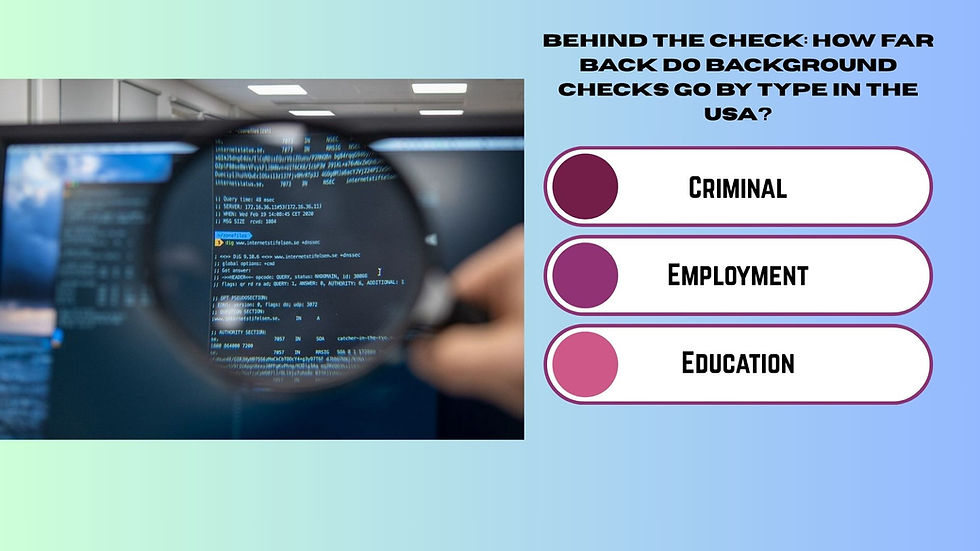Behind the Check: How Far Back Do Background Checks Go by Type (Criminal, Employment, Education) in the USA?
- Uri Burger
- Jul 21, 2025
- 6 min read
In the United States, navigating the complexities of employment background checks can feel like traversing a legal minefield. For job seekers, it's about understanding what past information might surface. For employers, it's about making informed hiring decisions while remaining compliant with a patchwork of federal, state, and even local laws. Proper understanding about how far background checks can go is essential for avoiding the confusions.
The key federal law governing most employment background checks is the Fair Credit Reporting Act (FCRA). This legislation dictates what information can be reported by Consumer Reporting Agencies (CRAs) – the third-party companies that conduct background checks – and for how long. However, the FCRA has specific limitations and exceptions, and state and local laws often impose even stricter rules.

Let's break down how far back different types of background checks typically go in the USA:
1. Criminal Background Checks: It's Complicated
This is perhaps the most nuanced area of background checks, with significant variations based on federal and state laws, and even the type of criminal record.
Federal FCRA (for Non-Convictions): The FCRA generally prohibits CRAs from reporting arrests that did not lead to a conviction for jobs paying less than $75,000 annually. These can include such as dismissals, acquittals, or cases that are more than seven years old. For jobs paying $75,000 or more, there is no federal time limit on reporting this type of information.
Federal FCRA (for Convictions): Crucially, the FCRA does NOT impose a time limit on the reporting of criminal convictions. This means that a felony conviction from decades ago could theoretically be reported on an employment background check.
State Laws: The Real Limiters: This is where the landscape becomes more complex. Many states have enacted their own "seven-year rules" or other lookback periods that do limit how far back criminal convictions can be reported for employment purposes, regardless of the FCRA's lack of a federal limit.
Common 7-Year States: States like California, Kansas, Maryland, Massachusetts, Montana, New Hampshire, New Mexico, New York , and Washington have laws restricting the reporting of convictions older than seven years. New York has an exception for higher-paying jobs and Washington also has higher-paying job exceptions. The "start date" for this seven-year period can vary (e.g., date of disposition, release from prison, or end of parole).
10-Year States & Indefinite Reporting: Other states may allow reporting of convictions for up to 10 years, or, in some cases, indefinitely.
"Ban the Box" Laws: A growing number of states and localities have "Ban the Box" laws. This law restricts when employers can ask about an applicant's criminal history, often delaying the inquiry until later in the hiring process. One such instance can be after a conditional offer of employment. These laws are designed to give individuals with criminal records a fair chance to demonstrate their qualifications before their past is reviewed.
Expungement and Sealing: If a criminal record has been legally expunged or sealed, it should generally not appear on a background check. However, the effectiveness of expungement varies by state. Sometimes human error or database lag can lead to expunged records still appearing. This requires the individual to dispute the information.
Sensitive Roles: For certain highly sensitive positions may permit or require a more extensive or even indefinite lookback period for criminal history. Some instances are such as those involving national security clearances, childcare, elder care, or roles in financial institutions, state and federal laws. This is permissible as the public safety implications are paramount.
2. Employment Verification: Typically 7-10 Years
Employment history verification is a standard part of most background checks. Key purposes of this include checking of job titles, dates of employment, and sometimes salary and reasons for leaving.
Standard Lookback: The FCRA does not impose a specific time limit on reporting employment history. However, most employers and CRAs typically focus on the most recent 7 to 10 years of a candidate's work history. This period is generally considered sufficient to assess recent career trajectory, job stability, and relevant experience.
All Reported Employment: If a candidate lists employment stretching back further than 10 years on their resume or application, a background check agency will often attempt to verify all listed positions. The challenge might be in the availability of records or responsiveness from very old employers.
Addressing Gaps: Significant employment gaps are often flagged during employment verification. The check might not actively "seek out" unlisted jobs from decades ago. However, it will highlight any unexplained breaks in the candidate's provided history.
Professional Licenses: Verification of professional licenses (e.g., for doctors, nurses, lawyers, real estate agents) can go back to the date the license was first issued. These credentials are often crucial for the role and disciplinary actions can have long-term relevance.
3. Education Verification: Often Indefinite
Unlike other components, education credentials generally do not expire and therefore do not have a time limit for verification in the same way.
Lifetime Verification: A degree obtained 30 years ago is just as relevant to a candidate's qualifications as one obtained last year. Therefore, education verification can, and often does, go back indefinitely to confirm all listed degrees, certifications, and institutions attended.
Highest Degrees & Certifications: The primary focus is typically on the highest degree attained (e.g., Bachelor's, Master's, Ph.D.). Any relevant professional certifications are also taken into consideration. However, if a candidate lists multiple degrees, all are usually verified.
Common Practice: While verification can go back indefinitely, in practice, CRAs will focus on verifying the educational institutions and degrees listed by the candidate on their application or resume.
Challenges: The main hurdle with very old educational records can be the availability of digitized records. Another hurdle can be the responsiveness of institutions with older, less automated record-keeping systems. Reputable CRAs have processes to handle such situations.
Other Types of Checks and Their Lookback Periods:
Credit Checks (for Employment): The FCRA generally limits the reporting of most adverse credit information (like collections, paid tax liens, civil judgments) to seven years. Bankruptcies can be reported for up to 10 years. However, for jobs with an annual salary of $75,000 or more, these FCRA lookback limits may not apply. This means, more extensive credit history could be reported. Many states also restrict the use of credit checks for employment purposes.
Driving Records (MVR): Typically, Motor Vehicle Records (MVRs) show a history of 3 to 7 years. This can vary by state and the nature of the violation. For roles requiring driving, more comprehensive checks may be performed.
Drug Testing: This is typically a current check and does not have a lookback period in the traditional sense. However, past failed drug tests might be indirectly discoverable through other records.
Social Media Checks: There are no specific lookback periods for public social media information. On the contrary, employers must be extremely careful to avoid discriminatory practices when reviewing these profiles.
Key Takeaways for Job Seekers and Employers:
Know Your Rights (FCRA): Both job seekers and employers must understand the FCRA's provisions regarding background checks. Especially the requirement for consent, the adverse action process, and the 7-year limits on certain types of information.
State and Local Laws Matter: The "seven-year rule" is not universal for all information. State and local laws often dictate stricter or different lookback periods, particularly for criminal records and the use of credit history.
Transparency is Key: For job seekers, being honest about your past, especially concerning criminal history (if it's a conviction that can be reported), is always advisable. For employers, transparent communication about the background check process is crucial for a positive candidate experience and legal compliance.
Relevance to the Role: For employers, a critical consideration is the "job-relatedness and business necessity" of the information found. Does a very old criminal record or a minor credit issue truly impact a candidate's ability to perform the job duties or pose an unacceptable risk?
Professional Assistance: Due to the complex and evolving nature of background check laws, both job seekers (e.g., to understand what might appear) and especially employers (to ensure compliance) often benefit from consulting with legal counsel or utilizing reputable, FCRA-compliant background screening companies.
The scope of a background check in the USA is a dynamic interplay of federal and state regulations. The type of information sought, and the nature of the job. Understanding these nuances is essential for navigating the hiring landscape effectively and fairly.




Comments